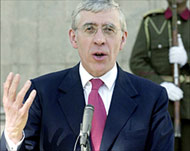British Gaza deployment plan discussed
A new British proposal to send military advisers to oversee the pullout of Israeli troops from Gaza has been discussed by the British and Palestinian prime ministers.

A source close to the negotiations confirmed to Aljazeera.net that the “security plan” had been talked about on Monday as “a sub-chapter of a comprehensive discussion”.
The proposal would involve British forces deploying in Gaza to help Palestinians police the territory if Israel goes ahead with a unilateral retreat from the Strip.
Ama Annan, a Foreign Office spokesperson suggested that sequencing would be key to any future developments.
“We haven’t made an announcement,” she told Aljazeera.net. “But if there were to be one, it would come from the Palestinians, not from us. We will support them with whatever they come up with.”
“We talk to the Palestinians about security all the time,” she added, “but as the withdrawal from Gaza hasn’t been announced, it will be a while before they come up with any detailed ideas.”
Speaking at the Royal Institute of International Affairs, Quraya said any agreement on a Gaza pullout would have to be bilaterally agreed.
“I don’t know how this will come about without co-ordination and talks with the Palestinians,” he said. “How will it be handled? What kind of security will there be? Where will the passages between Gaza and abroad go? No one knows.”
End to peace
Quraya warned that any unilateral withdrawal, combined with the completion of what he called “the wall of terror”, would be a disaster.
“It would put an end to the option of peace totally, and pave the way for a new cycle of violence, terrorism and bloodshed.”
|
“It (a unilateral Israeli withdrawal from Gaza) would put an end to the option of peace totally, and pave the way for a new cycle of violence, terrorism and bloodshed” Ahmad Quraya, |
Later, at a press conference, the foreign secretary, Jack Straw, confirmed that the option of sending international monitors was under consideration.
“We’re always available to offer what advice we can and, of course, as part of a longer term solution, we would be willing to consider more active use of British monitors.”
He said such a move could only take place with the agreements of both Israelis and Palestinians.
British-Palestinian relations
 |
|
Jack Straw says sending |
Meanwhile, Afif Safiah, the Palestinian ambassador to London, hailed Jack Straw’s words as a sign that British-Palestinian relations were “significantly improving”.
“When Jack Straw expressed condolences for Palestinian casualties yesterday and the day before in the Gaza Strip, he was the first British statesman ever to do so,” Safiah told Aljazeera.net.
“For us it was important, moving and, alas, unprecedented.”
Safiah described the talks as “extremely fruitful” but pointed to some of the difficulties ahead.
“We believe we are entering a difficult year,” he said. “It is the US presidential election year and there is a fear of paralysis and a vacuum in diplomatic endeavours.
West Bank annexation?
“We believe that the EU through the Quartet should reactivate the peace process. In the EU, Britain is – for the American administration – the most acceptable country to play such a role.”
|
“It is the US presidential election year and there is a fear of paralysis and a vacuum in diplomatic endeavours. We believe that (the) EU through the Quartet should reactivate the peace process” Afif Safiah, |
Over the course of the day, Quraya held talks with Straw and the leaders of the three main political parties. His meeting with Blair lasted 50 minutes.
He also met representatives of British Gas to discuss exploration work on potential oilfields off the Gaza Strip.
In a sign of the seriousness attached to the visit, Quraya was accompanied by several cabinet ministers including the foreign minister, Nabil Shaath, the finance minister, Salam Fayyad, and the chief negotiator, Saib Uraiqat.
Palestinian fears that a Gaza pullout would coincide with an annexation of large parts of the West Bank have been stoked by a recent Israeli newspaper report.
Israeli plan
According to Haaretz, Israel will demand the US recognise annexation of settlements such as Ariel, Gush Etzion and Ma’ale Adumim, reject the right of return for Palestinian refugees, and rule out further negotiations on any other plan as the price for the pullout.
“The Israelis seem to be negotiating with themselves on those issues,” Afif Safiah quipped on hearing of the news.
Earlier, Quraya had stressed the urgency of the situation.
“Time is running out for the two-state solution. The elements of chaos and collapse are growing fast in the region. The moderates and forces for peace are losing their credibility as time passes,” he said.
“Those calling for a negotiated settlement based on mutual respect and a balance of interests are gradually being weakened due to the spread of violence, tension and reoccupation.
“I call on the US administration to act upon its moral and political responsibilities as a sponsor of the peace process. Without the US, the greatest superpower in the world, it will not be possible to end this conflict.”